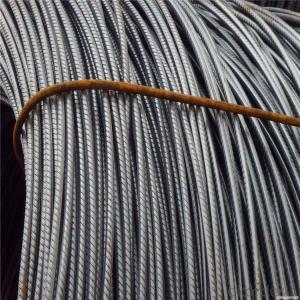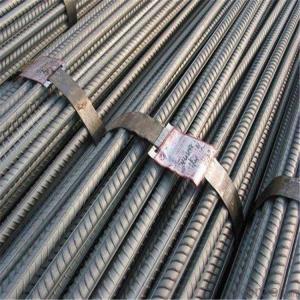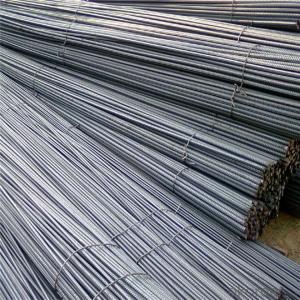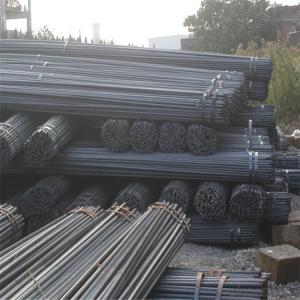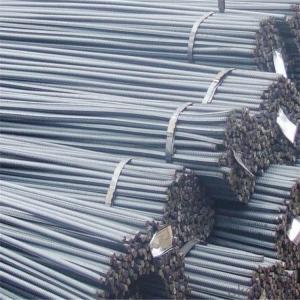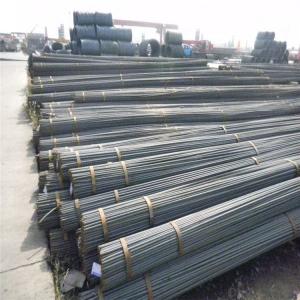Steel Rebar HRB400 Grade for Building Material
- Loading Port:
- Tianjin
- Payment Terms:
- TT or LC
- Min Order Qty:
- 150 m.t.
- Supply Capability:
- 500000 m.t./month
OKorder Service Pledge
OKorder Financial Service
You Might Also Like
Item specifice
Steel Rebar HRB400 Grade for Building
Description of Steel Rebar HRB400 Grade for Building
1, Diameter: 5.5mm-10mm Steel Rebar HRB400 Grade for Building
10m- 40mm Steel Rebar HRB400 Grade for Building
2, Length: 6m, 9m, 12m or customized
3, Standard: GB, ASTM, AISI, SAE, DIN, JIS, EN
2, Produce Process: hot rolled or forged to get the steel round bar and plate
3, Heat Treatment: annealing, normalizing, tempering, quenching
4, Surface Treatment: Black
5, Quality Assurance: We accept third party inspection for all orders.
Chemical Composition of Steel Rebar HRB400 Grade for Building
Grade | Technical data of the original chemical composition(%) | |||||
Reinforcing steel bar HRB335 | C | Mn | Si | S | P | B |
≤0.25 | ≤1.60 | ≤0.80 | ≤0.045 | ≤0.045 | >0.0008 | |
Physics Capability | ||||||
Yield Strength(N/cm2) | Tensile Strength(N/cm2) | Elongation(%) | ||||
≥ 335 | ≥490 | ≥16 | ||||
Reinforcing steel bar HRB400 | C | Mn | Si | S | P | B |
≤0.25 | ≤0.16 | ≤0.80 | ≤0.045 | ≤0.045 | 0.04-0.12 | |
Physics Capability | ||||||
Yield Strength(N/cm2) | Tensile Strength(N/cm2) | Elongation(%) | ||||
≥ 400 | ≥ 570 | ≥ 14 | ||||
Products Show of Steel Rebar HRB400 Grade for Building
Company Information
CNBM International Corporation is the most important trading platform of CNBM group.
Whith its advantages, CNBM International are mainly concentrate on Cement, Glass, Iron and Steel, Ceramics industries and devotes herself for supplying high qulity series of refractories as well as technical consultancies and logistics solutions.


F A Q
1, Your advantages?
professional products inquiry, products knowledge train (for agents), smooth goods delivery, excellent customer solution proposale
2, Test & Certificate?
SGS test is available, customer inspection before shipping is welcome, third party inspection is no problem
3, Factory or Trading Company?
CNBM is a trading company but we have so many protocol factories and CNBM works as a trading department of these factories. Also CNBM is the holding company of many factories.
4, Payment Terms?
30% TT as deposit and 70% before delivery.
Irrevocable L/C at sight.
5, Trading Terms?
EXW, FOB, CIF, FFR, CNF
6, After-sale Service?
CNBM provides the services and support you need for every step of our cooperation. We're the business partner you can trust.
For any problem, please kindly contact us at any your convenient time.
We'll reply you in our first priority within 24 hours.
- Q:How is special steel used in the production of conveyor belts?
- To improve the durability, strength, and overall performance of conveyor belts, special steel is utilized during their production. Conveyor belts are commonly employed in industries like mining, manufacturing, food processing, and logistics for the transportation of materials and goods. These belts face various challenging conditions, including heavy loads, high temperatures, and abrasive materials. To ensure the longevity and reliability of conveyor belts, specific parts are constructed using special steel alloys such as stainless steel or heat-resistant steel. For instance, stainless steel is frequently used in wire mesh belts to prevent corrosion and rust, especially when the conveyor belt is exposed to moisture or chemicals. This safeguards the smooth and efficient movement of materials, preventing contamination. Moreover, special steel is incorporated in the manufacturing of belt fasteners, hinges, and other connecting components. These parts must endure substantial tension, heat, and wear, making standard steel inadequate in terms of strength and durability. Special steel alloys offer superior strength, high temperature resistance, and improved wear resistance, ensuring the reliable functioning of conveyor belts even under demanding conditions. Additionally, in applications where conveyor belts are subjected to extreme temperatures, such as steel mills or foundries, special heat-resistant steel is utilized. This type of steel can withstand intense heat without deformation or loss of strength, enabling the conveyor belt to operate safely and efficiently in such extreme environments. In conclusion, special steel plays a crucial role in enhancing the durability, strength, and ability of conveyor belts to withstand challenging conditions. Its utilization in wire mesh belts, fasteners, hinges, and heat-resistant components ensures the longevity and reliability of conveyor belts across diverse industries.
- Q:What are the requirements for special steel used in high-pressure applications?
- Special steel used in high-pressure applications must meet certain requirements in order to ensure its durability and reliability under extreme conditions. Some of the key requirements for this type of steel include: 1. High strength: Special steel for high-pressure applications needs to have exceptional strength to withstand the intense forces and pressures it will be subjected to. This allows it to resist deformation and maintain its structural integrity. 2. Excellent corrosion resistance: The steel must have a high resistance to corrosion, as it will often come into contact with aggressive fluids or gases in high-pressure environments. This prevents the steel from deteriorating over time and helps to maintain its performance and longevity. 3. Good weldability: Special steel used in high-pressure applications should possess good weldability to enable easy and efficient joining of different components. This ensures the overall integrity and reliability of the system. 4. High temperature resistance: The steel must have the ability to withstand elevated temperatures without losing its mechanical properties. This is particularly important in applications where high-pressure fluids or gases are heated or where the steel is exposed to extreme heat sources. 5. Fatigue resistance: Special steel should have a high resistance to fatigue failure, as it will often be subjected to cyclic loading and pressure fluctuations. This allows the steel to withstand repeated stress and pressure cycles without developing cracks or failures. 6. Tight dimensional tolerance: The steel should have tight dimensional tolerance to ensure proper fit and functionality within the high-pressure system. This helps to minimize leakage or any potential weak points in the system. 7. Compliance with industry standards: Special steel used in high-pressure applications should meet relevant industry standards and specifications, such as those set by organizations like the American Society of Mechanical Engineers (ASME) or the American Petroleum Institute (API). This ensures that the steel meets the required quality and performance standards. Overall, special steel for high-pressure applications needs to possess a combination of high strength, excellent corrosion resistance, good weldability, high temperature resistance, fatigue resistance, tight dimensional tolerance, and compliance with industry standards to ensure its suitability and reliability in demanding environments.
- Q:Can special steel be used in the defense industry?
- Yes, special steel can be used in the defense industry. Special steel alloys, such as armor-grade steel or stainless steel, possess unique properties that make them suitable for various defense applications. These steels offer enhanced strength, durability, and resistance to corrosion and high temperatures, making them ideal for manufacturing military vehicles, aircraft, naval vessels, and ballistic protection systems. Additionally, special steel can also be used in the production of weaponry, including firearms, missiles, and armored vehicles, due to its ability to withstand extreme conditions and provide superior performance in combat situations.
- Q:How does hot rolling affect the microstructure of special steel?
- Hot rolling is a metalworking process that involves heating the steel above its recrystallization temperature and then passing it through a series of rollers to reduce its thickness. This process has a significant impact on the microstructure of special steel. During hot rolling, the high temperature causes the grains in the steel to recrystallize, removing any existing defects and creating a more uniform and refined grain structure. This recrystallization process results in smaller and more equiaxed grains, which enhances the mechanical properties of the steel. Additionally, hot rolling promotes the formation of certain microstructural features such as dislocation cells and subgrains. These features help to increase the strength and toughness of the steel, making it suitable for various applications that require high performance and durability. Moreover, hot rolling can also lead to the precipitation of certain alloying elements within the steel. These precipitates can play a crucial role in enhancing specific properties of the steel, such as corrosion resistance or high-temperature strength. Overall, hot rolling has a profound influence on the microstructure of special steel. It refines the grain structure, promotes the formation of beneficial microstructural features, and facilitates the precipitation of alloying elements. These microstructural changes contribute to the improved mechanical properties and performance of the steel, making it a preferred choice in industries such as automotive, aerospace, and construction.
- Q:What are the main applications of special steel in the mining equipment?
- Special steel is widely used in mining equipment due to its high strength, durability, and resistance to corrosion. It is primarily used for components such as drill bits, cutting edges, crushers, conveyor systems, and buckets. The superior properties of special steel enable these mining equipment to withstand harsh operating conditions and enhance overall productivity and efficiency in the mining industry.
- Q:What are the different types of free-cutting steel?
- The different types of free-cutting steel include leaded free-cutting steel, sulfurized free-cutting steel, and resulfurized and rephosphorized free-cutting steel.
- Q:What are the different welding methods used for special steel?
- There are several welding methods that can be used for special steel, depending on the specific requirements of the project. Some of the commonly used welding methods for special steel include: 1. Gas Metal Arc Welding (GMAW): Also known as MIG welding, this method uses a consumable electrode and a shielding gas to protect the weld from atmospheric contamination. GMAW is ideal for welding special steel as it provides high-quality, clean welds with minimal spatter. 2. Gas Tungsten Arc Welding (GTAW): Also known as TIG welding, this method uses a non-consumable tungsten electrode and a shielding gas to protect the weld. GTAW is often used for special steel as it allows for precise control over the welding process, resulting in high-quality, defect-free welds. 3. Shielded Metal Arc Welding (SMAW): Also known as stick welding, this method uses a consumable electrode coated in flux to protect the weld. SMAW is commonly used for special steel as it is a versatile and portable method that can be used in various positions and environments. 4. Flux-cored Arc Welding (FCAW): This method uses a tubular electrode filled with flux to protect the weld. FCAW is often used for special steel as it provides high deposition rates and deep penetration, making it suitable for thicker materials. 5. Submerged Arc Welding (SAW): This method uses a continuously fed wire electrode and a granular flux that is applied around the weld. SAW is commonly used for special steel as it can produce high-quality, high-integrity welds in thick sections. It is important to note that the selection of the appropriate welding method for special steel depends on various factors such as the type and thickness of the steel, the desired weld quality, and the specific application requirements. Therefore, it is recommended to consult with welding professionals or engineers to determine the most suitable method for a particular project involving special steel.
- Q:How does special steel contribute to the manufacturing of bearings?
- Special steel plays a crucial role in the manufacturing of bearings due to its unique properties and characteristics. Bearings are mechanical components that facilitate smooth rotation or movement between two surfaces. Special steel, also known as bearing steel, is specifically designed to meet the demanding requirements of bearing applications. Firstly, special steel offers exceptional hardness, which is crucial for bearings to withstand heavy loads and high-speed rotations. The hardness of the steel allows the bearing to resist wear and deformation, ensuring a longer lifespan and reliable performance. Secondly, special steel possesses excellent corrosion resistance. Bearings often operate in harsh environments where they are exposed to moisture, chemicals, and other corrosive substances. The special steel used in bearing manufacturing effectively prevents rust and deterioration, ensuring the bearings can withstand these challenging conditions. Furthermore, special steel has superior heat resistance and thermal stability. Bearings can generate significant heat during operation due to friction and pressure. The special steel used in their production can withstand high temperatures without losing its structural integrity, preventing premature failure and ensuring consistent performance. Additionally, special steel offers exceptional strength and toughness. These properties are vital for bearings to withstand the intense forces and impacts they experience during operation. The high strength and toughness of the steel prevent fractures, breakages, and other forms of damage, contributing to the overall durability and reliability of the bearings. Lastly, special steel has excellent dimensional stability and machinability. This allows for precise manufacturing and shaping of the bearing components, ensuring accurate dimensions and smooth surfaces. The dimensional stability of the steel ensures that the bearings can maintain their proper fit and alignment within the machinery, minimizing any potential issues or malfunctions. In conclusion, special steel is essential in the manufacturing of bearings due to its hardness, corrosion resistance, heat resistance, strength, toughness, dimensional stability, and machinability. These properties enable bearings to withstand heavy loads, high speeds, harsh environments, and intense forces, ensuring reliable and efficient operation in a wide range of applications.
- Q:Can special steel be used in the rubber manufacturing industry?
- Yes, special steel can be used in the rubber manufacturing industry. Special steel can be utilized in the production of various rubber processing equipment, such as molds, dies, and machinery parts, due to its high strength, durability, and resistance to wear and tear.
- Q:How does special steel contribute to the manufacturing aftermarket industry?
- Special steel plays a significant role in the manufacturing aftermarket industry by offering enhanced performance, durability, and reliability in the production of various components and equipment. One of the key contributions of special steel is its ability to withstand extreme conditions, such as high temperatures, corrosive environments, or heavy loads. This makes it an ideal material for manufacturing critical parts used in industries like automotive, aerospace, energy, and machinery. In the manufacturing aftermarket industry, special steel is commonly used in the production of replacement parts for machinery or equipment that have become worn out or damaged over time. The use of special steel ensures that these replacement parts possess the necessary strength and resilience to meet the original equipment manufacturer (OEM) specifications. Furthermore, special steel allows for the development of innovative designs and the production of more efficient and lightweight components. This helps in improving the overall performance of the equipment, reducing energy consumption, and enhancing productivity. For example, in the automotive industry, special steel is used to manufacture lightweight engine components, resulting in improved fuel efficiency and reduced emissions. Moreover, the use of special steel in the manufacturing aftermarket industry contributes to the reduction of maintenance and downtime costs. By using high-quality steel, the longevity of the replacement parts is increased, reducing the frequency of repairs or replacements. This leads to a decrease in production downtime and associated costs, as well as improving the overall reliability of the equipment. Additionally, special steel offers a wide range of customization options, enabling manufacturers to tailor the material properties to specific requirements. This flexibility allows for the development of unique solutions and the production of specialized components that meet the demands of various industries. It also enables manufacturers to address specific challenges related to wear resistance, hardness, or toughness, which are crucial factors in the aftermarket industry. In conclusion, special steel contributes significantly to the manufacturing aftermarket industry by providing enhanced performance, durability, and reliability to replacement parts. Its ability to withstand extreme conditions, enable innovative designs, reduce maintenance costs, and offer customization options makes it an indispensable material in the production of components and equipment in various industries.
1. Manufacturer Overview |
|
|---|---|
| Location | |
| Year Established | |
| Annual Output Value | |
| Main Markets | |
| Company Certifications | |
2. Manufacturer Certificates |
|
|---|---|
| a) Certification Name | |
| Range | |
| Reference | |
| Validity Period | |
3. Manufacturer Capability |
|
|---|---|
| a)Trade Capacity | |
| Nearest Port | |
| Export Percentage | |
| No.of Employees in Trade Department | |
| Language Spoken: | |
| b)Factory Information | |
| Factory Size: | |
| No. of Production Lines | |
| Contract Manufacturing | |
| Product Price Range | |
Send your message to us
Steel Rebar HRB400 Grade for Building Material
- Loading Port:
- Tianjin
- Payment Terms:
- TT or LC
- Min Order Qty:
- 150 m.t.
- Supply Capability:
- 500000 m.t./month
OKorder Service Pledge
OKorder Financial Service
Similar products
New products
Hot products
Related keywords
